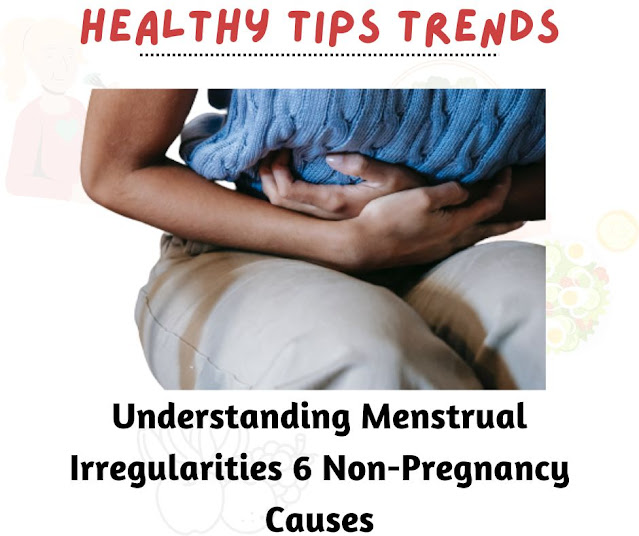A female's sexual well-being is mostly determined by her regular cycle of periods. The time of the menstrual cycle, meanwhile, may be impacted by several factors, leading to missed or delayed periods.
While pregnancy is often the first concern when a period is late, it is essential to remember that several other reasons can cause menstrual irregularities. In this article, we will explore six common factors that can contribute to a late period, besides pregnancy, and provide insights into understanding and managing these situations.
Stress and Emotional Well-being
Stress can significantly impact a woman's menstrual cycle. Pressure causes the release of enzymes such as cortisol and adrenaline, which can change the vital chemical equilibrium required for periodic menstruation. This disruption can lead to anovulation (absence of ovulation), resulting in a missed or delayed period.In addition to stress, emotional well-being plays a crucial role in menstrual regularity. This condition, feelings of elation or despair, and other sorts of mental diseases can have an effect on the hypothalamic-pituitary-ovarian (HPO) axis, resulting in development variance that unarguably alters the menstrual cycle.
A period's regularity can be restored by learning to handle stress, including through methods of mediation, exercise, and wellness.
Weight Fluctuations and Eating Disorders
Sudden or significant changes in body weight can disrupt hormone production and influence the menstrual cycle. Weight gain and loss can also create hormonal abnormalities, resulting in periods that vary or a missing cycle entirely.Furthermore, eating disorders, including the two types of anorexia, can have a negative impact on hormone function due to dietary shortages and high limits on calories.
These illnesses can result in menstrual cramps or the absence of the period, which can suggest long-term fertility health problems.
PCOS (Polycystic Ovules Syndrome)
A frequent hormonal illness affecting women of male age is polycystic ovary syndrome, also referred to as PCOS. It is distinguished by insulin resistance, a defect in the hormones that regulate sexuality, and the formation of small bumps on the interior of the follicles.These hormonal abnormalities may cause irregular or skipped menstruation and interfere with the cycle of the period.
PCOS can cause symptoms in women, including excessive nail growth, pimples, and trouble getting pregnant. Early diagnosis and proper management of PCOS are crucial to preserving fertility and overall health. The possibilities for treatment for high insulin levels may include changes in lifestyles, chemical treatments, and drugs.
Thyroid Disorders
The thyroid region is essential for controlling hormone synthesis and metabolism. Thyroid illnesses such as a lack of thyroid (underactive thyroid) and excess thyroid hormone (overactive thyroid) can interfere with a menstrual cycle that occurs.The cycle of periods is slowed down in diabetes because the thyroid gland does not generate adequate hormonal substances. Contrarily, hyperthyroidism causes an overproduction of the thyroid's hormones, which may cause lighter and shorter intervals.
Getting regular thyroid screenings and managing thyroid disorders with medication can help restore menstrual regularity.
Medications and Birth Control
Certain medicines, primarily those that alter hormones, may have an influence on the menstrual cycle. Natural pills, relaxants, and clotting drugs They are, and therapeutic drugs can all disrupt the cycle of menses.Hormone sterilization methods, such as pill form, patches, and devices placed in the uterus, limit conception by modifying testosterone levels. These methods can cause lighter periods, irregular bleeding, or even amenorrhea in some cases.
Consult your doctor for suggestions on different therapies or alterations to your existing drug schedule if you think a medicine is interfering with the course of your menstruation.
Perimenopause and Menopause
The period known as the period is a transitional phase that women experience as they pass their late 30s into their early 40s. The female ovaries generally achieve fewer levels of progesterone and estrogen throughout this time, resulting in erratic periods and feminine cycle alterations. Eventually, menstruation stops altogether, marking the onset of menopause.Hot indications Mood fluctuations and alterations in menstruation patterns are just a few of the symptoms that can result from the phases and early stages of It's crucial to talk with the doctor if you think you are probably suffering from this period, so they may give you advice and assistance.
Conclusion
While pregnancy is a common reason for a late period, several other factors can lead to menstrual irregularities. Stress, emotional well-being, weight fluctuations, PCOS, thyroid disorders, medications, and perimenopause are all possible culprits for a delayed or missed menstrual cycle. Realizing those variables and their influence on reproduction may inspire women to take charge of their wellness and to access proper medical care when necessary. If you have recurrent menstruation disruptions or have questions about your period health, it is critical to visit a doctor for a reliable evaluation and individualized therapy.


.png)
.png)

.png)
.png)
.jpg)

.jpg)
